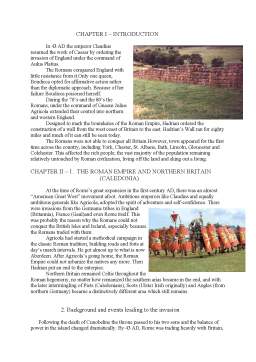Cuprins
- Chapter I – Introduction
- Chapter II – 1. The Roman Empire and Northern Britain(Caledonia)
- 2. Background and events leading to the invasion
- 3. Planning the invasion
- 4.The invasion
- Chapter III – The Battle of Medway
- Chapter IV - Roman battle tactics
- Chapter V –1. Overcoming a siege
- 2. Enter the ballista
- 3. The Roman tortoise
- Chapter VI – 1. Roman towns
- 2. Some tows were unplanned
- 3. The layout of Roman towns
- 4 .The layout of Colchester
- ChapterVII - 1. Roman soldier’s weapon
- 2. History of the fort
- 3. Slivers of wood
- 4. Military life
- 5. On the move
- 6. More beer please!
- 7. Entrepreneurs
- 8. Flavius Cerialis and his family
- 9. Patronage
- 10. Promotion
- 11.Leisure time
- Chapter VIII – 1.Family visits
- 2. Food
- 3. Clothing
- Chapter IX – The Roman army in Britain
- Chapter X – 1. The Late Empire
- 2. Resistance
- Conclusion
Extras din proiect
CHAPTER I – INTRODUCTION
In 43 AD the emperor Claudius resumed the work of Caesar by ordering the invasion of England under the command of Aulus Platius.
The Romans conquered England with little resistance from it.Only one queen, Boudicca opted for affirmative action rather than the diplomatic approach. Because of her failure Boudicca poisoned herself.
During the 70’s and the 80’s the Romans, under the command of Gnaeus Julius Agricola extended their control into northern and western England.
Designed to mark the boundaries of the Roman Empire, Hadrian ordered the construction of a wall from the west coast of Britain to the east. Hadrian’s Wall ran for eighty miles and much of it can still be seen today.
The Romans were not able to conquer all Britain.However, town appeared for the first time across the country, including York, Chester, St. Albans, Bath, Lincoln, Gloucester and Colchester. This affected the rich people; the vast majority of the population remaining relatively untouched by Roman civilization, living off the land and eking out a living.
CHAPTER II – 1. THE ROMAN EMPIRE AND NORTHERN BRITAIN (CALEDONIA)
At the time of Rome’s great expansion in the first century AD, there was an almost “American Great West” movement afoot. Ambitious emperors like Claudius and equally ambitious generals like Agricola, adopted the spirit of adventure and self-confidence. There were invasions from the Germanic tribes in England (Britannia), France (Gaul)and even Rome itself. This was probably the reason why the Romans could not conquer the British Isles and Ireland, especially because the Romans traded with them.
Agricola had started a methodical campaign in the classic Roman tradition, building roads and forts at day’s march intervals. He got almost up to what is now Aberdeen. After Agricola’s going home, the Roman Empire could not urbanize the natives any more. Then Hadrian put an end to the enterpise.
Northern Britain remained Celtic throughout the Roman hegemony, no matter how romanized the southern arias became in the end, and with the later intermingling of Picts (Caledonians), Scots (Ulster Irish originally) and Angles (from northern Germany) became a distinctively different area which still remains.
2. Background and events leading to the invasion
Following the death of Cunobeline the throne passed to his two sons and the balance of power in the island changed dramatically. By 43 AD, Rome was trading heavily with Britain, especially in the metals that they needed for everyday items. Britain, and mostly the South East, had taken a distinct anti-Roman attitude. Even though Britain was trading heavily with Rome, discontent grew. Such matters as the taxes paid to Rome were causing anger amongst the Britons.
The factors that Claudius took into account before the planned third invasion :
• Rome had, up to this point, enjoyed useful political and trading relationships which they wanted to keep alive.
• Trade was bringing in a good income, especially for the wine growers, the pottery factories and merchandise in general.
• The Spanish silver mines, for which Rome depended to produce raw materials for the manufacture of it's currency were running low. Shafts had to be dug deeper. This meant that less material was available and with deeper mines, the time and cost factor rose sharply.
• Information arrived from Rome that extensive surface deposits of argentiferous lead ore (galena) had been found in the South West region of Britain.
• This invasion would enable Claudius to deflect attention from his political battles with the Senate of Rome.
• Iron was also available throughout Britain, which could be used to repair ships damaged in the invasions of 55 and 54 BC.
There seemed little alternative for Claudius and his advisors. A full scale invasion to take complete control was the only course of action.
To the Emperor, this reversal in attitudes was an insult to his great forbear, Julius Caesar. There is nothing any roman cherished so much as a great victory to boost his personal image and that of Rome.
The Roman Empire was in a peaceful stage and so it was possible to gather an army of troops for this task.
Claudius gathered together and formidable army. Following on from the failures of Julius Caesar, he planed this invasion with the utmost care. His first action was to retire those who did not reach a set level of fitness.
Preview document
Conținut arhivă zip
- The Roman Civilization in Britain.doc



































